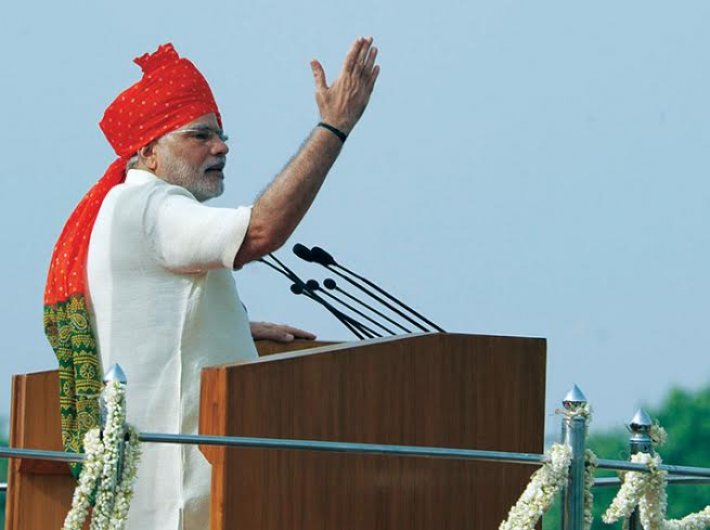The overarching message of his first 100 days is that the new Modi is a man above partisan lines, working untiringly only for the good of the country.
The cliché about India – whatever you say about it, the opposite is equally true – can be applied to Narendra Modi too. Thus, his growing number of fans and the remaining critics both are sometimes right. That may not have been the case earlier in his role as chief minister, but after becoming the prime minister he has once again attempted to remodel himself, fashioning himself as a statesman-in-the-making. In the process, however, there have been divergent trends. For instance, inviting the Pakistan prime minister for the swearing-in ceremony was as surprising as withdrawing from the foreign secretary-level talks.
The overarching message of his first 100 days is that the new Modi is a man above partisan lines, working untiringly only for the good of the country. Gone are the belligerent attacks on the Delhi sultanate and shrill calls for a Congress-free India. Gone are the days when he constantly sought to hog the headlines with controversial remarks. Instead, he seeks to take everybody along. He is positively avoiding the media. There is no harping on divisive communal symbols. His single-minded focus is on governance, on revamping the administrative machinery and making it work for development – something he has been credited with in his earlier role. He is bringing in innovative ideas (how surprising that nobody before him thought of launching a campaign for toilets!). He is ready for radical departures (his predecessor too spoke of revamping the planning commission, but nobody so far had the guts to fold it up). He is prepared to go beyond party politics, and continue bright ideas of the previous government (Aadhaar being a prime example).
This brighter side of the story formed the tone and tenor of Modi’s Independence Day speech – the best by any PM in recent decades, according to many commentators. A new energy seems to be unleashed from the very top, and countless people across the country are infected, taking Modi’s ways as a matter of inspiration. And that is what leaders are supposed to deliver, right? For your vote, what more could you have expected?
But then there is the other side of the story. To begin with, Modi is turning decentralisation of power upside down. Fine, that is the price to be paid for a strong leader. In the government, as well as in the party, there is no place for veterans. Well, veterans never could deliver such a dramatic election result. Dealing with what can be called the main opposition on the matter of naming the leader of opposition and the building friction with the judiciary would have been handled with tact by any other government. This is why the adjective ‘brutal’ sticks to ‘majority’ in such cases.
But more worrying is the trend of hardcore Hindutva elements in the ‘sainya bhaye kotwal’ mode. For the sake of argument, the case of the communal cauldron called Uttar Pradesh can be put aside, because it is a complicated case involving much more than just the BJP factor. But the remarks and actions of people ranging from Dina Nath Batra to Mohan Bhagwat, who want to convince others that India is a Hindu nation, unnerve a majority of those who voted for Modi. They voted for him on the hope of clean and efficient governance, and ignored the saffron streak. The disturbing part is that Modi too is now ignoring this saffron baggage, not asking them to pipe down. This duality of development with Hindutva, often called Moditva, has been the essence of the man so far. Is he changing? The first 100 days provide thin evidence for either answer.
To give the busiest man in India the benefit of doubt, yes, it is just 100 days. In the remaining term, as he works hard to mould India’s reality, rest assured that India’s reality too would be moulding him.
This story first appeared in Magazine Vol 05 Issue 15(01-15 Sept 2014)

